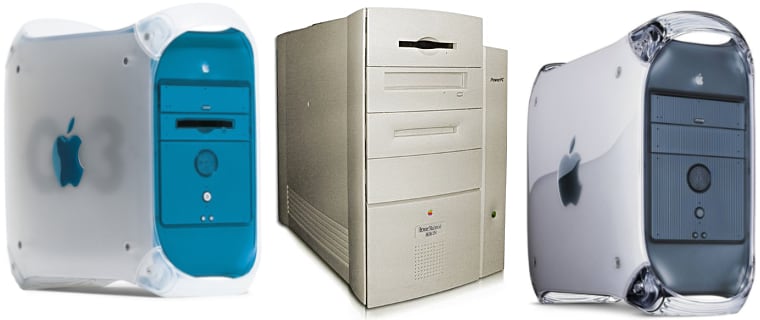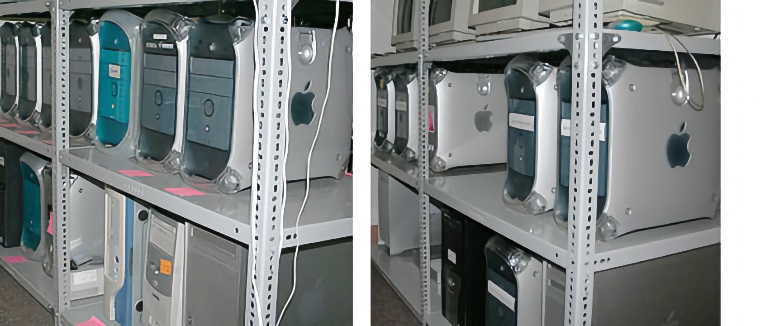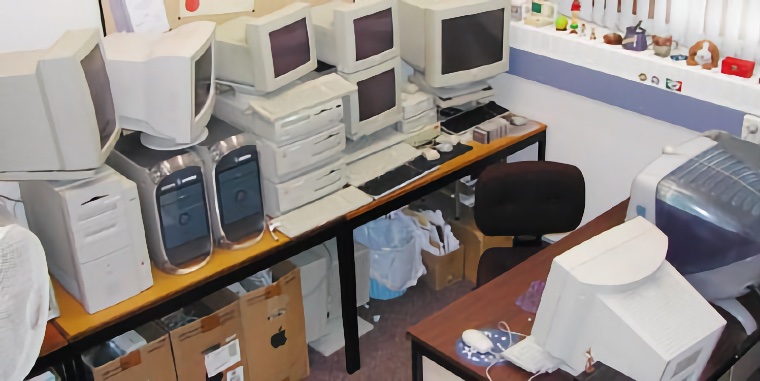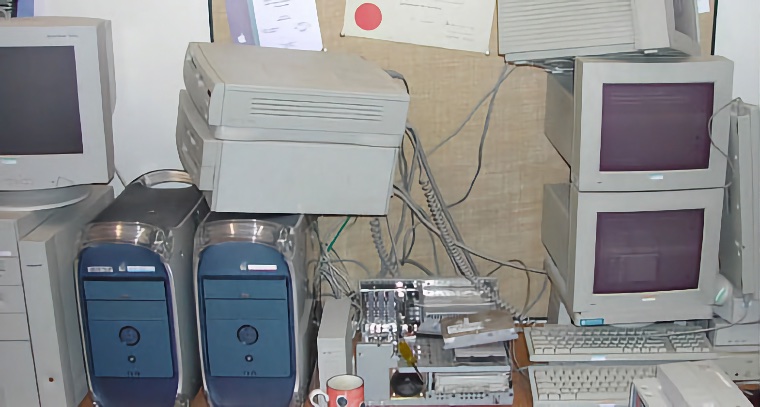 Work Office 2000-2010 Computers have changed a lot over the last 10 or 20 years, and so has my job. Generally this has been a change to more specialisation, so I have had a lot less variety in my work over time, and this is reflected in my office layout. Update: October 2007 The setup of the servers continues to evolve. My personal web site, and a few other smaller sites, have been moved form my main work web server to a similar machine at home. I maintain over 10 small servers which provide services such as web and database serving, list serving, file serving, and (mostly) backup services. I use medium to large hard disks (250 to 500 G) for backup and data storage. The total capacity of these drives is around 4 terabytes.  Some of the servers we have in our equipment room at work. Most of these are small backup servers for departments which backup between 20 and 100 computers each. Some are file servers, web servers, and database servers. Update: January 2007 I now have a MacBook Pro 17 inch 2.3 Ghz Core 2 Duo to replace the PowerBook G4 (which I have kept to test older programs). It has 2 GB of RAM, a serial ATA 160G hard drive, a dual layer DVD writer, 802.11n wireless, a 1680 x 1050 17" screen, and many other nice features. In case you're wondering, the MacBook Pro is also the main machine in my home office - one of the advantages of a laptop! Update: July 2006 My server setup is now simplified. I have merged the functions of several old servers onto a smaller number of newer, faster machines. All the hardware is now G4 or G5 based and all servers are running Mac OS X or Mac OS X Server (10.3 and 10.4). I have also shifted the backup systems from SCSI tape drives to large internal hard disks. For example, one server has 4 x 300 G hard drives giving over 1 terabyte of storage, this is equivalent to about 50 DDS4 tapes and is much faster and more reliable. Update: April 2004 We now have a separate server room so the servers are gradually being moved out of my office. At the same time, more machines are moving in. At least the overall standard is increasing - I only have 2 beige boxes in my office now! The photo above shows my collection of G4 (plus one G3, and one 7300) servers which are currently in my office. I have 5 other backup servers (mostly power Mac 7300s) in our server room. They are all operated from my laptop using Apple Remote Desktop so I have been able to remove most of the monitors, keyboards, and mice. Most of the G4s have only 400 or 450 MHz processors, but they can easily handle the load required on our network. I have 9 main servers with a total of around half a terabyte of disk space and about 4G of memory. There are also 5 smaller servers running at around 180 MHz with tape drives. The tape archive contains about 3 terabytes of data. Update: August 2003 The latest news is that my main computer is now a Powerbook G4 17". I take it with me everywhere and get a lot of extra work done that way. All of the old computers mentioned below are still in use - the extra machine has meant I have re-allocated server loads but the old machines are still serving. Actually, I have even more servers now that in the photo below! My Work Office: 2002 The photo below shows the working computers in my office at work around the end of 2002. Various other machines littered about the room are being set up or modified.  This is a view of my office showing my main computers (on the desk at front) and the file, mail, list, web, and backup servers I run for various departments at the University. The computer at left is my main web/email/list server "macintosh.otago.ac.nz" (also owen2.otago.ac.nz) which these pages are being served from. It is a Power Mac 8600/200 running Mac OS 9, AppleShare IP and Macjordomo (list server). AppleShare IP is a bit flakey sometimes (especially the mail server) but overall its fairly stable, fast and easy to administer. The next computer is a Power Mac G4, also running AppleShare IP for file and FTP and WebStar for web services. Its a departmental server which I administer. The other G4 mini-tower to its right also belongs to a department. Its running Mac OS X server and Macintosh Manager. Its used as a lab server and has been fairly stable. Occasionally the University network causes problems but it probably only needs restarted once or twice a year. The top two beige boxes are a Power Mac 6200 and a Power Mac 7100 which run backup services (and occasional FTP and Web) for departments. They both run Retrospect, a very nice backup system, backing up mainly Macs but also a few PCs. The bottom beige box is another 7100. Its my database server which runs FileMaker Pro and serves about 15 on-line databases. Its running FileMaker Pro 5 on Mac OS 9. FileMaker and the Web Companion don't give the ultimate in speed but they are fairly reliable and easy to set up. To the right of the two stacked monitors are two DAT tape drives for the backup systems. They are both Sony units, one DDS-3 (12-24G) and the other DDS-2 (4-8G). Various old monitors are stacked wherever they will fit. Mostly these are black and white or color monitors which are faulty and not worth using for workstations any more. On the desk in front of the servers if my workstation, a G4/450 mini-tower running Mac OS X with 384M of RAM and a 20G hard disk. It also has an external 8G SCSI disk which I transfer data to/from work with. The graphite monitor is connected to that machine and the beige monitor is used with computers I have in for repair and installation. Perched on top of the small, black speaker at the bottom of the picture is a plastic model of Wile E. Coyote. I use "Wile E. Coyote" as my name when playing games, especially Marathon! Yes, I know, Wile E always loses. No comment! Also note Sideshow Bob, from the Simpsons, on the window sill. The Simpsons is one of my favourite TV programs (I watch very little TV) and Bob is one of my favourite characters.  The picture above (circa 2002) shows most of my current servers with one of them being fitted with a new hard disk. Those old Apple monochrome screens stack quite nicely! The servers are all running while the change-over (shown above) happens. Total down time was about 40 seconds - the time it took to restart from the new drive (even that wouldn't have been necessary if I hadn't wanted to run the system off the new drive instead of the old one). The SCSI in Macs is very tolerant, connecting and dis-connecting drives while the machine is running isn't a problem! A utility like SCSI-Probe helps.
| ||||||||||||||||||||||||||||||||||